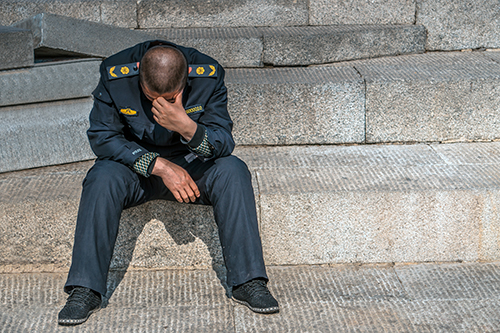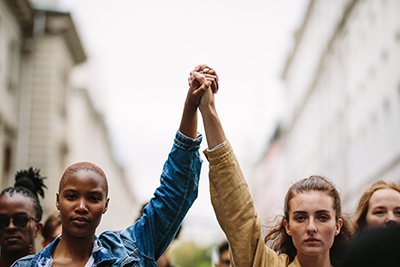Improve policing--change police hiring system
Posted on December 30, 2020
 In America, relations between police and the communities they serve are strained to the breaking point. Everyone from police officers to community groups to government entities are all doing their best to come to terms with the growing problems of the use of force, trust and equality in policing.
In America, relations between police and the communities they serve are strained to the breaking point. Everyone from police officers to community groups to government entities are all doing their best to come to terms with the growing problems of the use of force, trust and equality in policing.
While I applaud efforts to address the issues, most of the suggested solutions deal only with the symptoms of a deeper problem, decades in the making. Restrictive measures on police tactics, punitive measures and investigating police officers after an incident has occurred will do little to keep them from happening again.
As a member of the House of Representatives in 2016, I authored a report to the Governor’s Task Force on Police Use of Force. My suggestions were based on my 25-year career in police work, from which I retired in 2006 as a police commander, and commander of a 15-city Homicide/Violent Crimes Task Force. I also chaired the House Public Safety Committee.
The root problem in policing today comes from the over-militarization of our civilian police forces. Decades ago, unemployed veterans, many with combat experience, were being pushed into civilian police work. Federal programs initiated and encouraged this process because they believed that the only real qualification for civilian police work was weapons proficiency. Large bonus preference points in civil-service hiring ensured that unemployed combat veterans would get available police jobs, pushing out many other qualified candidates.
As this trend continued, the U.S. Department of Justice and the National Association of Sheriffs and Police Chiefs issued a report indicating serious problems with some veterans. Combat veterans generally were found to have a low tolerance for citizen complaints; a reduced empathy for people; frustrations with families and others; indifference to problems; isolation and a desire to return to combat; having an us-versus-them mentality; feelings of stress, anxiety and nightmares; and a belief that they operated under a different set of rules of engagement from their nonmilitary colleagues.
The report went on to say that veterans tended to have difficulties in adjusting their use-of-force thresholds and adhering to domestic operating procedures in civilian police work. Studies, including one by the Oxford Academic Journal of Public Health, have shown that those with past military employment are two to three times more likely to be involved in police shootings.
At the same time, poorly paid police officers were gaining more off-duty employment to supplement their incomes, leaving them tired at work. Fatigue can be roughly equivalent to being intoxicated. Airline pilots and truck drivers are not allowed to work in this sleep-deprived condition, but police officers are usually allowed to put on a badge and a gun, and patrol streets after working an off-duty job the night before. The officer who killed George Floyd was an Army veteran who worked security the prior evening at a local bar.
Military training teaches people to kill. It is what soldiers are trained to do. Problem solvers, listeners and de-escalation techniques are useless in combat, and will get you and others around you killed. Armies and war are for when diplomacy, reason and compromise are over, and it is time for your soldiers to kill the enemy. Civilian police work is a different mission and training regimen, of which weapons proficiency is an incredibly small element.
Today’s problem is not one of “bad cops” but rather the wrong people in the wrong job. Holding them accountable, though a well-intentioned approach, will just keep this cycle going if we do not address the underlying problem.
Here are some ideas:
-
End the use of veterans in civil service and stop awarding combat bonus points for employment consideration. Instead, we should require a college degree for those entering police work and implement a minimum age requirement of 23. These should not be waived for prior police work or military experience.
-
Set a statewide minimum salary of $112,000 for anyone entering police work and a guaranteed salary of $168,000 at five years to recruit and retain college graduates, along with a program for paid college tuition for those committing to enter this line of work.
-
Cut overtime hours dramatically and require rest. End off-duty employment so officers are awake and ready to serve the public when they report for duty.
-
Have a single statewide hiring and bargaining system on economic issues only.
Defunding or cutting the salaries of police is wrong if we want professional problem-solving police officers. To truly help veterans, we should help them get college educations and jobs that they want and for which they are qualified, not just push them into police work.
If this is successful, other accountability measures, although probably necessary now, will seldom be used in the future.
Christopher Hurst is a retired veteran law enforcement detective and commander of a 15-city homicide/violent crimes task force. He also represented the 31st Legislative District in the state House of Representatives between 1999 and 2017. He served as chair of the House Public Safety, Commerce & Gaming and Community Security Committees.
SEE ALSO:
More Race Relations Articles
Sexual Bias Articles
Mental Health Articles
How Drugs and Alcohol Affect the Brain and Body
WA. Counselor Directory: find a therapist near you
How helpful is this web page to you?
(and how can we can improve this page for you?)
not helpful
very helpful
Other Articles
Fired but still a cop
How Washington States decertification process leaves troubled officers with their guns
In the span of two months, he slammed a driver to the ground using an unsanctioned takedown, allegedly called a Black suspect a “monkey,” and pepper-sprayed a suspect who was strapped down to a h... read more
I am a Black Police Officer. Here is How to Change the System.
Yes, defund the police. But then re-fund them, better.
NEWPORT NEWS, Va. — When I entered the police force in Virginia in 1987, I was one of the few Black officers in my department. On my first day on patrol, I was paired with an experienced white officer.... read more
What does the phrase, Law and Order mean to you?
You may not have consciously considered this before, but to me, “Law and Order” means, people will know the law and obey it so we are safe as possible from conflict with our fellow human beings a... read more
A possible America begins with anti-racist training
Racism is not American. Talking about and fighting racism is.
On Sept. 4, President Donald Trump pledged to identify and cancel all anti-racist training contracts for federal government agencies, calling them “divisive, un-American propaganda trainings,&rdqu... read more





